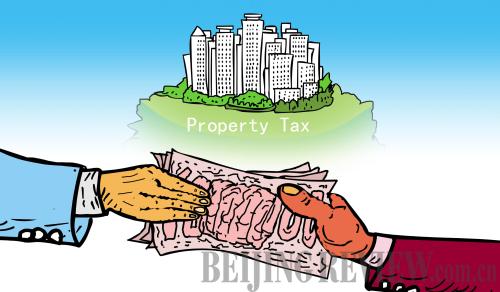|
 |
|
(LI SHIGONG) |
After years of test runs, property tax may be adopted all over China, with Beijing and Shenzhen as pilot cities, said the Shanghai Securities News early last month.
For years, economists have suggested China introduce a property tax, levied annually on the value of property holdings.
Proponents believe, in China, land occupancy charges are a lump sum, which results in high housing purchase costs but low holding costs. In order to maintain local economic growth and high fiscal revenues, some local governments sell a large quantity of land within a short period. In this way, they gain land bonuses expected over following decades, that is, they are taking advantage of future generations' wealth. But, the property tax targets fixed assets and, as long as the properties are occupied, tax revenues will exist. This will ensure future generations secure lives and help reduce property speculation and rein in surging housing prices.
Online surveys show a majority of respondents are cautious about the effects of a property tax. About 44.7 percent of the people surveyed by news portal Sina.com.cn say they believe it would not curb market speculation, and more than 60 percent of the respondents said levying property tax would not drive housing prices down. Another survey by news portal Sohu.com found 51.2 percent of respondents were unconditionally opposed, while only 29.93 percent approved.
Opponents say China is extensively populated but has limited land resources. Still, most people cherish the traditional concept of possessing their own homes. Unless serious economic crises lead to depression of the housing market, strong market demand will probably push up property prices. In this case, even if a tax on the value of property holdings helps reduce real estate developers' costs, their pursuit of maximum profit margins will continue to maintain prices at high level. As a result, while developers' profit margins are expanding, homebuyers do not receive any tangible benefits.
A practical solution
Ma Hongman (Guangzhou Daily): Property tax floats with the rising or falling of house values, so the risk in buying a home will always be there as long as the buyer still owns the property. In this sense, property tax will be a big blow to speculators. Some speculators will therefore quit the market and finally housing prices may return to a reasonable level. The tax is a kind of local tax, so its levy will rid local governments of the bad habit of depending on land sales for fiscal revenues and cut the interest chain connecting local governments and property developers. This will effectively bring down housing prices.
Yang Hongxu (Life Daily): China's current housing tax framework is quite irrational. There are too many taxable items during the process of housing development and sales. Such a framework is actually pushing up housing prices. As for property developers, they are able to transfer high costs to housing prices. Sellers can also transfer tax costs to buyers. Because those who own houses have almost no tax burden, many speculators tend to buy multiple homes and wait for a rise in housing prices.
In the short term, we should not expect the new tax to bring housing prices down sharply. In the long run, it will surely help clamp down on speculative purchases and help stabilize the property market.
Bi Ge (Xi'an Evening News): As we all know, the basic function of homes is to ensure people are sheltered. The introduction of a property tax means homeowners must pay a certain price for their properties. To some extent, it's a kind of punishment on those who buy too much property. In this way, the tax will curb market speculation.
At present, those who oppose housing price reductions claim that home buying is a kind of investment instead of consumption. They believe government interference in housing prices is not necessary.
But, like food and clothing, housing naturally is something to satisfy people's basic survival needs. To judge whether it is consumption or investment, we only need to see whether housing has been purchased for living in or for selling.
| 